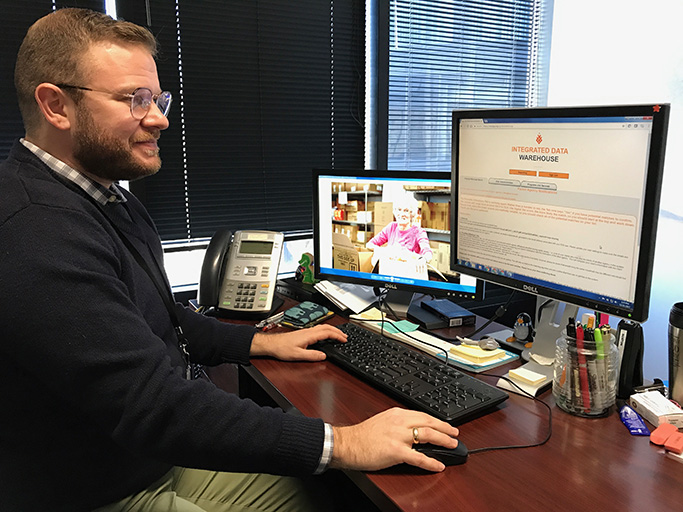Let’s say a Jewish Federation client walks into Kleinlife for the first time. We’ll call her Mrs. Goldstein. Mrs. Goldstein arrives at Kleinlife for lunch — as part of the older adult socialization program — and registers her personal information in Kleinlife’s database. After lunch, let’s say she decides to get some groceries from the Jewish Federation’s on-site Mitzvah Food Program pantry. She once again registers her personal information, this time into the Mitzvah Food system. Mrs. Goldstein may already be in other Jewish Federation-affiliated databases as well, for example, if she’d ever requested home repairs or rides to synagogue through the Northeast Naturally Occurring Retirement Community (NORC).
One client, with several database entries, spanning several organizations who didn’t share information? The Social Responsibility department at the Jewish Federation of Greater Philadelphia recognized that this scattershot record-keeping needed a high-tech fix. “We needed a tool that could take in all of that information from different places, and organize it,” remembers Associate Director Han Meadway.
The solution, called Integrated Data Warehouse (IDW), took six years of careful planning, and since its 2015 implementation has been nothing short of revolutionary. It securely organizes a huge volume of information across the systems of 19 Jewish Federation-funded programs at 10 different agencies. For Mrs. Goldstein, that means she no longer has to input her information when she receives services for the first time from a different agency; with her permission, the information is shared across the system, including any updates to her contact information
That time-saving convenience is only the beginning of IDW’s impact. Now that every organization has a fuller picture of Mrs. Goldstein’s interactions with the Jewish Federation, we have a better idea of what other services she might benefit from, and can refer her to a partner agency with a click of a button. “So if you needed additional food resources, we could make sure you get a box from JRA. If you needed care management services, we could refer you to JFCS for a case manager. If you needed an emergency home repair, we could refer you to the NORC, or to Female Hebrew Benevolent Society for an emergency grant,” explains Han. “We want to make sure that all individuals who are eligible for services are receiving all of those services.”
Having such information in one place also means that the Jewish Federation can efficiently monitor and track client services — de-identified, to protect client privacy — to make sure each person is well-served in a timely fashion. In addition, it allows for better future planning, by giving an accurate picture of how many people use which resources and in which geographic areas.
Serving our communities is central to each initiative we undertake at the Jewish Federation. To help us continue to efficiently respond to the needs of our Jewish communities, click here to donate.



